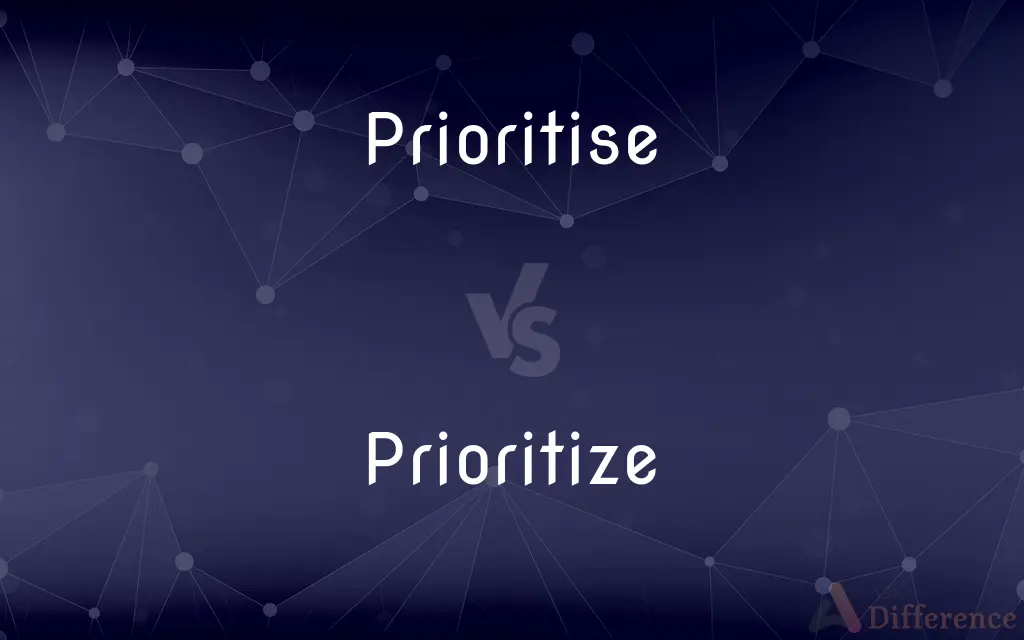Prioritise vs. Prioritize — What's the Difference?
By Maham Liaqat & Fiza Rafique — Updated on March 3, 2024
Prioritise and prioritize both mean to arrange or deal with in order of importance; the difference lies in their spelling, with "prioritise" being preferred in British English and "prioritize" in American English.

Difference Between Prioritise and Prioritize
Table of Contents
ADVERTISEMENT
Key Differences
Prioritise is the British English spelling of the verb that means to arrange items or tasks in order of importance. It reflects the spelling conventions of British English, where the suffix "-ise" is commonly used in verbs that end in "-ize" in American English. Prioritize, on the other hand, is the American English spelling of the same verb. American English favors the suffix "-ize" in many words where British English uses "-ise." This difference is part of a larger pattern of spelling variations between these two versions of English.
The choice between prioritise and prioritize does not affect the meaning of the word; it purely reflects regional spelling preferences. While "prioritise" might be more commonly seen in British publications, "prioritize" is prevalent in American texts.
Usage of prioritise versus prioritize can sometimes signal the intended audience or origin of a document. For example, a British company might use "prioritise" in its internal and external communications, whereas an American company would use "prioritize."
Despite the spelling differences, the pronunciation of both terms is virtually identical in general American and British English, making this distinction more about orthography than phonology.
Comparison Chart
Spelling
Uses "-ise" at the end
Uses "-ize" at the end
ADVERTISEMENT
Origin
British English
American English
Usage
Preferred in the UK, Commonwealth, and some international English forms
Preferred in the United States
Pronunciation
Virtually identical to "prioritize"
Virtually identical to "prioritise"
Meaning
To arrange or deal with in order of importance
To arrange or deal with in order of importance
Compare with Definitions
Prioritise
To give preferential attention or treatment to something.
We must prioritise safety measures in our planning.
Prioritize
To arrange items or tasks in order of their importance.
She will prioritize her assignments to manage her time efficiently.
Prioritise
To allocate resources or time according to importance.
The teacher will prioritise reading skills in the upcoming semester.
Prioritize
To treat or regard something as more important than other things.
The health department will prioritize epidemic prevention.
Prioritise
To organize tasks by their level of urgency.
He decided to prioritise the project deadlines over the team meeting.
Prioritize
To focus on what is most important or urgent.
He needs to prioritize fixing the leak before painting the house.
Prioritise
To make something the most important focus.
The company will prioritise customer satisfaction this quarter.
Prioritize
To decide the order for dealing with tasks, people, or issues.
Managers should prioritize customer complaints promptly.
Prioritise
To determine the order of importance among a list of tasks.
She needs to prioritise her homework before going to the cinema.
Prioritize
To establish the most important task or goal.
This year, the NGO will prioritize community outreach programs.
Prioritise
(British spelling) prioritize
Prioritize
To arrange or deal with in order of importance.
Prioritise
Assign a priority to;
We have too many things to do and must prioritize
Prioritize
To treat or consider as of greater importance than other matters
Economic policies that prioritize job creation.
Prioritize
To put things in order of importance.
Prioritize
(transitive) To value, do, or choose something first, or before other things.
Prioritize
To arrange or list a group of things in order of priority or importance.
Prioritize
(transitive) To rank something as having high priority.
Prioritize
Assign a priority to;
We have too many things to do and must prioritize
Common Curiosities
Why does British English use prioritise instead of prioritize?
British English often uses the "-ise" suffix as a matter of convention, reflecting its approach to words of this type.
Is there any difference in pronunciation between prioritise and prioritize?
No, there is no significant difference in pronunciation between the two terms in general American and British English.
Is prioritize accepted in British English?
While "prioritize" is primarily American English, it is understood and sometimes used in British English, especially in international contexts.
Can prioritise and prioritize be used interchangeably?
Yes, they can be used interchangeably, depending on the audience's regional English preference.
Do prioritise and prioritize have the same meaning?
Yes, both words have the same meaning: to arrange or deal with in order of importance.
Are there any contexts where one spelling is preferred over the other?
Yes, in formal writing and publications, the spelling that matches the regional English of the audience is preferred.
What is the main difference between prioritise and prioritize?
The main difference is in spelling: "prioritise" is used in British English, while "prioritize" is used in American English.
Does the choice of spelling affect the verb's meaning?
No, the choice of spelling does not affect the meaning of the verb.
What guides the choice between using prioritise and prioritize?
The choice is largely guided by regional spelling conventions: British English for "prioritise" and American English for "prioritize."
Is the usage of prioritize increasing in British English?
Yes, the usage of "prioritize" has been increasing in British English, partly due to American influence.
In which English-speaking countries is prioritise more common?
"Prioritise" is more common in the UK, Australia, New Zealand, and other Commonwealth countries.
How can I remember when to use prioritise or prioritize?
Remember that "ise" is more common in British English and "ize" in American English.
Is it incorrect to use prioritize in a British English context?
It's not incorrect, but "prioritise" is the spelling more commonly expected in British English contexts.
Do dictionaries list both spellings of prioritise/prioritize?
Yes, most comprehensive dictionaries list both spellings and note the regional preference.
Are there other words with similar British and American spelling differences?
Yes, there are many words with similar spelling differences, such as "organise/organize" and "realise/realize."
Share Your Discovery

Previous Comparison
Belgian vs. Belgium
Next Comparison
Respect vs. AdmireAuthor Spotlight
Written by
Maham LiaqatCo-written by
Fiza RafiqueFiza Rafique is a skilled content writer at AskDifference.com, where she meticulously refines and enhances written pieces. Drawing from her vast editorial expertise, Fiza ensures clarity, accuracy, and precision in every article. Passionate about language, she continually seeks to elevate the quality of content for readers worldwide.
















































